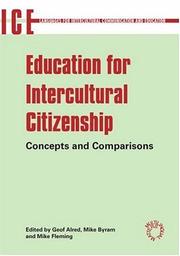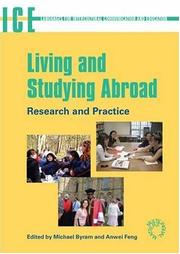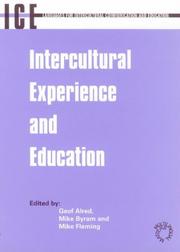| Listing 1 - 4 of 4 |
Sort by
|
Book
ISBN: 9781907078781 Year: 2019 Publisher: La Vergne Management Pocketbooks
Abstract | Keywords | Export | Availability | Bookmark
 Loading...
Loading...Choose an application
- Reference Manager
- EndNote
- RefWorks (Direct export to RefWorks)


ISBN: 1853599190 1853599182 1853599204 9781853599194 9781853599187 9781853599200 1280609672 9786610609673 Year: 2006 Volume: 13 Publisher: Bristol Blue Ridge Summit
Abstract | Keywords | Export | Availability | Bookmark
 Loading...
Loading...Choose an application
- Reference Manager
- EndNote
- RefWorks (Direct export to RefWorks)
This book presents a vision of education for citizenship, which takes as its starting point an account of what it means to be intercultural. Theory and concepts of interculturality are applied to citizenship education in order to extend its meaning and significance within and beyond the nation state. The book advances a concept of intercultural citizenship which is sensitive to complexities of identity and diversity and, through international case studies, analyses the degree to which intercultural citizenship is present or emergent in contemporary education systems It provides a statement of ‘axioms and characteristics’ of education for intercultural citizenship to act both as a framework for planning education for intercultural citizenship and as criteria for evaluating the degree of intercultural citizenship education already present in existing education systems. The book will be of interest to those currently working in intercultural education as well as those who work in education for citizenship.
Citizenship --- Multicultural education --- Study and teaching --- #SBIB:316.334.1O340 --- #SBIB:324H60 --- Birthright citizenship --- Citizenship (International law) --- National citizenship --- Nationality (Citizenship) --- Political science --- Public law --- Allegiance --- Civics --- Domicile --- Political rights --- Onderwijs en sociale verandering, onderwijs en samenleving --- Politieke socialisatie --- Law and legislation --- Citizenship. --- Education --- Social Sciences --- Education, Special Topics --- Citizenship - Study and teaching - Cross-cultural studies. --- Multicultural education - Cross-cultural studies. --- citizenship education. --- intercultural citizenship. --- intercultural competence.


ISBN: 1280609656 9786610609659 1853599123 9781853599125 9781280609657 1853599115 1853599107 9781853599118 9781853599101 6610609659 Year: 2006 Publisher: Bristol Blue Ridge Summit
Abstract | Keywords | Export | Availability | Bookmark
 Loading...
Loading...Choose an application
- Reference Manager
- EndNote
- RefWorks (Direct export to RefWorks)
The internationalisation of higher education has led to study abroad being a large scale phenomenon. Students spend short periods on study tours or a year or more taking courses in foreign universities. Studying aboard cannot be dissociated however from learning to live in another country and culture. The need to adapt to a new education system is obvious but the inevitable difficulties of living in another culture for the purpose of study are also an important facet of the whole experience. Chapters in this book report research into this whole phenomenon. Authors have researched students travelling across the world, from East to West and West to East, and also the effects of studying in countries which seem to be more like students’ own. Each chapter explains the case in question, the findings from the research and what the implications might be. The second part of each chapter is then a critical reflection on the research methods used. The book thus provides a guide to the complexity of this kind of research and how that complexity can be handled with appropriate techniques and methods.
Foreign study. --- Foreign study --- International study --- Study abroad --- Studying abroad --- Education --- Students, Foreign --- Research. --- Research --- Methodology. --- education. --- higher education. --- intercultural education. --- study abroad.


ISBN: 1280739274 9786610739271 1853596086 9781853596087 6610739277 1853596078 185359606X Year: 2002 Publisher: Bristol Blue Ridge Summit
Abstract | Keywords | Export | Availability | Bookmark
 Loading...
Loading...Choose an application
- Reference Manager
- EndNote
- RefWorks (Direct export to RefWorks)
This edited volume explores the educational significance of intercultural experience. It offers a broader conception of interculturality than commonly found in the area of foreign language teaching. Contributors represent a diverse range of academic and professional interests. The aim of the book is to encourage dialogue and interchange across this range, and beyond, to stimulate thinking about the educational value of intercultural experience.
| Listing 1 - 4 of 4 |
Sort by
|

 Search
Search Feedback
Feedback About UniCat
About UniCat  Help
Help News
News